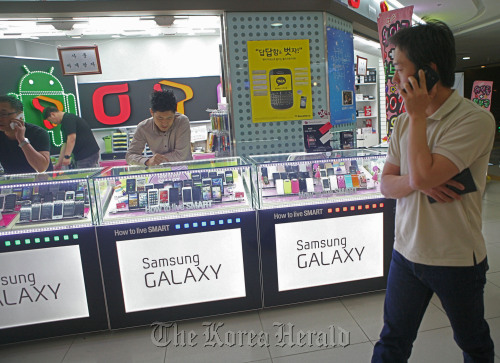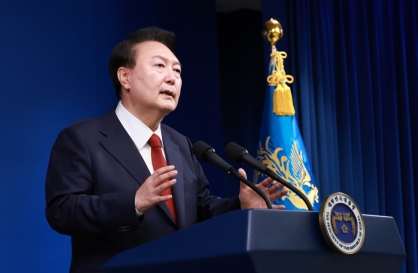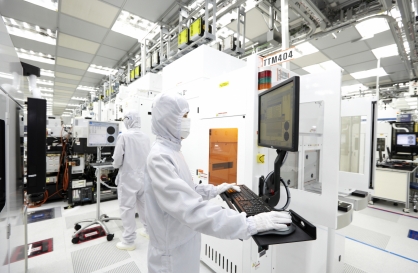Watchdog predicts cuts in smartphone prices; companies see very limited impact
The Korea Communications Commission plans to implement the so-called “blacklist system” in May, which officials predict could drastically transform the nation’s distribution structure for handsets.
Currently, telecom companies register an International Mobile Equipment Identity number to activate the service of all new phones they sell, called the “whitelist system.”
Under the new plan, however, all cell phones will be allowed to access network services, except those “blacklisted,” or reported stolen or lost by their owners.
Consumers will no longer be obliged to buy a new phone from the nation’s three telecom carriers ― SK Telecom, KT Corp. and LG Uplus ― as they will be allowed to use any distribution channel.
The Korea Communications Commission plans to implement the so-called “blacklist system” in May, which officials predict could drastically transform the nation’s distribution structure for handsets.
Currently, telecom companies register an International Mobile Equipment Identity number to activate the service of all new phones they sell, called the “whitelist system.”
Under the new plan, however, all cell phones will be allowed to access network services, except those “blacklisted,” or reported stolen or lost by their owners.
Consumers will no longer be obliged to buy a new phone from the nation’s three telecom carriers ― SK Telecom, KT Corp. and LG Uplus ― as they will be allowed to use any distribution channel.

To activate the network service, all they will have to do is insert a universal subscriber identity module chip sold by the mobile carrier they want to use into the phone.
The government claims that diversified distribution channels will encourage more competition within the market and finally prompt price cuts of handsets.
Meanwhile, businesses predict a very limited impact from the proposed system, saying that the Korean mobile market has already been dominated by high-end smartphones.
Over the past year, the average price of newly launched smartphones hovered at 900,000 to 1 million won (about $880) here. Samsung Electronics previously released some low-end models, but their prices were still high at 500,000 to 600,000 won.
Even though the number of smartphones in Korea is expected to surpass the 30 million mark at the end of this year, the nation’s telecom watchdog has urged manufacturers to make cheaper handsets for existing feature phone users.
Under the new system, consumers will have less discount benefits compared to when they purchase a phone through a package plan offered by telecom companies.
“The key for the success of the new system is that more diverse products, especially low-end phones, are launched for consumer choice,” said a KCC official.
But the nation’s top three handset makers, Samsung, LG and Pantech, said they have no immediate plans to launch low-end phones.
“Korea is a very unique market. People don’t hesitate to buy a new phone despite the growing prices. Even those who rarely use the Internet prefer the latest handset,” said an industry source.
“Without witnessing any apparent increase in the demand for cheaper phones, companies will not roll out low-end products.”
Korea, along with Turkey, is the only country that has maintained the current “whitelist system.” In other countries, the distribution of cell phones and network services have long been separate.
According to the KCC, local telecom companies offer 25 to 33 percent cheaper discount deals for users when they purchase a new phone based on their two-year contracts.
The government has requested that companies offer price cuts of a similar level to customers who only purchase a USIM chip under the new system.
Telecom companies, already suffering from political pressure on mobile rate cuts, are fiercely resisting.
“Discount deals are promotional benefits offered to our consumers. We cannot offer the benefits for phones that we don’t sell. It would be reverse discrimination against our existing users,” said a telecom company spokesperson.
Companies also raised security concerns as handsets purchased overseas could be used in Korea under the new system.
“We test every new handset model to check whether the device creates any excessive traffic or other problems on our networks,” said another company official.
“For handsets that are distributed by other retailers, we cannot predict what problems they could create.”
Amid mixed projections by the government and industry, it seems unavoidable that consumers will face confusion when purchasing a new phone following the introduction of the new plan.
Chung Hyun-sook, a 57-year-old housewife, said she has postponed changing her ailing feature phone until May.
“Smartphones are too expensive for a housewife like me to use. But my children told me that the price could be halved under the new system next month,” she said.
Lee Ji-hyun, a 29-year-old office worker, said she would still prefer buying a phone through the monthly plans offered by telecom companies.
“Under the new system, I have to pay a lump sum of money to get a new one. Purchasing a separate USIM chip also feels less convenient,” she said.
By Lee Ji-yoon (jylee@heraldcorp.com)
-
Articles by Korea Herald









![[K-pop’s dilemma] Time, profit pressures work against originality](http://res.heraldm.com/phpwas/restmb_idxmake.php?idx=644&simg=/content/image/2024/05/08/20240508050705_0.jpg&u=20240508171126)









![[Today’s K-pop] Stray Kids to drop new album in July: report](http://res.heraldm.com/phpwas/restmb_idxmake.php?idx=642&simg=/content/image/2024/05/09/20240509050659_0.jpg&u=)